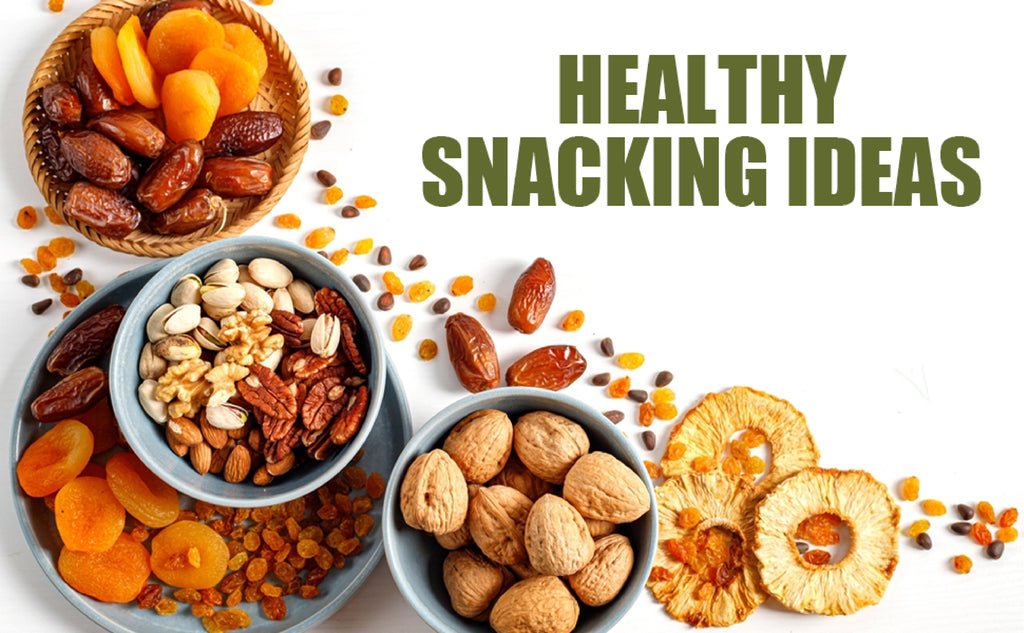Benefits Of Healthy Snacking
Posted by HIMALAYAN CHEF

What are Snack Foods?
Food gives us the energy we need to live and grow, but it may also make us want to snack whether we're depressed, anxious, happy, bored, or putting anything off. Generally speaking, snacks are defined as any dietary item eaten in between large meals. There are various snack options, both healthful and unhealthy. Having a snack during the day helps with blood sugar regulation, hunger prevention, and supplying energy for exercise. It helps meet regular portions of fruits and vegetables and fuels cells, particularly for busy lives.
Healthy Snacking
Some of the most popular healthy snack options include nuts, seeds, granola bars, fruit, and veggies.
Power Snacking is a method of meal planning that involves incorporating healthy snacks into your diet. To do this, consider the following steps:
• During a normal day, consider snacking when you tend to grab extra food or feel hungry.
• Identify if emotional or hunger-driven snacking is occurring. Practice mindfulness before you munch, if you are hungry.
• Select the snacks that will best fulfill your hunger. You'll feel less hungry, have a tasty snack, and be able to put food out of your mind until your next meal. Whole meals high in fiber, protein, and whole grains make for better snacks, according to studies.
• Select a high-fiber, high-water snack to help you feel fuller sooner. Snacks high in nutrients include raw or crunchy vegetable sticks, almonds, are some of the nutrient-dense snack options.
• A snack portion should be sufficient to satiate without increasing the amount of calories or interfering with your appetite.
What are Some Instant Snack Food?
For convenience, a lot of individuals use instant snacks as a kind of amusement or to break up the monotony of their daily lives. Typically, meals with inadequate nutritional content are denoted by the terms "instant" and "convenience". However, not all of these instant snacks are extremely processed, devoid of vitamins, or packed full of added sugars, sodium, or saturated fat. (Interestingly, those items are officially referred to as "ultra processed.") Infact, a selected range of nutritious instant foods optimizes the utilization of healthy foods. Some of the instant snacks include nuts, seeds, granola bars, protein bars and honey etc. There are different brands offering healthy snacks with no added preservatives and healthy packaging practices.
Compared to snacks heavy in fat, sugar, and salt, Himalayan Chef instant snacks are a healthier option. The brand have a wide range of healthy and tasty instant snacks such as:
⦿ Coconut Powder
⦿ Honey Coated Cashews
⦿ Mix Sweet Fennel Seeds
⦿ Roasted Black Chickpeas
⦿ Gur Mehwa with Desi Ghee
⦿ Honey Coated Almonds with Sesame Seeds
⦿ Rewari with Desi Ghee Combine with Sesame Seeds

Boost Energy Levels
Healthy instant snacks offer you a boost of energy if you go for extended hours without eating and your blood sugar falls. During low energy periods, snack foods like chips, cookies, and fried goods are poor in nutrients like protein and fiber and high in added sugars and refined carbs. Nuts, seeds, fruits, and veggies are examples of nutrient-dense foods that should be opted to boost your energy levels.

Nutrient Rich
Instant healthy snacks deliver additional nutrients that help to maintain your health and well-being. The snacks such as fruits, vegetables, nuts and seeds provide a range of vitamins and minerals such as B vitamins, vitamin C, carotenoids, iron, calcium and zinc. Moreover, they provide good fats such as omega 3 and 6 fatty acids. These healthy snacks are rich sources of fiber and antioxidants as well. All these nutrients help to maintain your immune system and prevent different disease conditions.
Prevent from Overeating
Instant healthy snacking reduces hunger so you don't overeat in your major meals. One strategy to avoid overeating is to eat Volumetric-Friendly Foods. Filling up on low-calorie, high-fiber foods like non-starchy vegetables is the main goal of the volumetric eating style. Before meals, consuming foods high in fiber and water content and low in calories will help you feel fuller and potentially prevent overeating.

Regulate Blood Glucose Levels
For people with diabetes, sensible and healthy snacking is crucial because it helps regulate blood sugar levels. You might need to consume carbohydrates as snacks during the day if you have diabetes. This will assist with blood sugar regulation. This is especially crucial if you have diabetes type 1. Healthy snacking throughout the day may be beneficial for certain type 2 diabetics who use insulin or other medications that might lower blood sugar (hypoglycemia).
Weight Management
You can lose weight by eating balanced meals and snacks, according to a study published in the Journal of the Academy of Nutrition. Reaching and maintaining weight goals can be facilitated by eating three meals and two snacks a day. Make sure your snack selections have the right amounts of all the important nutrients, such as fiber, protein, carbs, and fats. Use your creativity to put together meals that are both aesthetically pleasing and high in nutrients.
In Summary
A snack has to be filling without interfering with a meal or consuming excessive amounts of calories. A snack should typically contain between 150 and 250 calories. To determine one serving of packaged snacks, use the Nutrition Facts mentioned behind the package. Make sure you make the appropriate choices.
TAGS:
SHARE:


